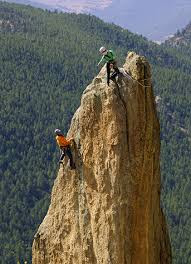Musings on Ultimate Reality, ethics, religion, social history, literature, media, and art
Friday, January 29, 2016
Guest Post: Do You Want to Know the Truth?
Here's an intriguing guest post from Professor James F. McGrath:
Do You Want To Know The Truth?
Hemant Mehta shared a really useful thought experiment/discussion starter, which deserves to circulate widely. It is inspired by a newspaper column by Robert Kirby, and takes the form of a simple question:
if there was a button that you could push, which would tell you definitively whether there is a God, and more specifically, whether your thinking about God is correct or not, would you push it?
The question might seem simple to answer, and it might seem that the obvious answer is “yes.” And I don’t disagree. But there are those who would not push the button, claiming that it would eliminate “faith.”
But in my view, that is a terrible way to think about “faith.” Faith should not be believing without evidence, or worse still, refusing evidence because we think there is some merit in refusing to fact check and investigate and just believe what we assume or have been told instead.
But of course, unless one or both of us pushes the button, we won’t know for sure whether or not my thinking about that is misguided.
I think the really interesting part comes when we reflect on what happens after we push the button and get our answer. If you find out your suspicion or strong conviction is right, how would your approach to life and to other people change now that you know for sure?
Would you become even more intolerant with others now that you know for sure that you are right?
If so, then perhaps not knowing for certain was indeed better for you.
And if you found out that you had been wrong, and some other group, whether atheists, Christians, Hindus, or no one on Earth was right, how would that affect you?
Would you embrace the truth with joy or begrudgingly, and why?
Your instinctive reaction will tell you something about where your foremost commitment lies: to the truth, or to your tribe.
I can also imagine that, even if the results of the button-pushing could somehow be guaranteed, there are those who would refuse to accept what was revealed. Would you possibly find yourself among them?
I hope you think about this, and then take the opportunity to discuss it in the comments below!
Dr. James F. McGrath is Clarence L. Goodwin Chair in New Testament Language and Literature at Butler University in Indianapolis, Indiana, USA.
http://www.patheos.com/blogs/exploringourmatrix/2016/01/do-you-want-to-know-the-truth.html
Hemant Mehta is the editor of Friendly Atheist, appears on the Atheist Voice channel on YouTube, and co-hosts the uniquely-named Friendly Atheist Podcast.
http://www.patheos.com/blogs/friendlyatheist/2016/01/25/when-it-comes-to-religion-do-you-even-want-to-know-the-truth/
--
Neil Carter has also, independently, weighed in on this question of truth/reality on Facebook. He wrote, "I don't think I became an atheist because I'm smarter than other people. I think they just quit asking the harder questions and I couldn't."
I guess that's the gist of human speculative guessing on ultimate questions.
Here's my own response to James McGrath's response to Hemant Mehta's response to Robert Kirby's article along with my own different philosophical climb related to Carter's mountain point:-)
Of course the reality is that seeking truth in all fields is nothing like a magical button push, but more like working one's way through a complicated maze...
...carrying untold weights, dealing with ill health issues,
helping others find their way...
managing to counteract strange people who keep trying to mislead one down wrong paths...
...even attackers trying to stop maze searchers for truth...
...and, despite all that and more difficulties, when going indeed seems impossible, one keeps going!
A more apt image for seeking truth would be--if truth is at the top of Mt. Everest
or some other peak of incredible height,
would you make the arduous climb, no matter what, and accept what is true?
Yes.
However, my main question isn't whether God exists or not. I worked through that at university to a very deep level and came out a committed theist (though on Thursday, I am still an existentialist;-).
What concerns me much more is the second part of Metha and McGrath's question:
What is God/Truth/Ultimate Reality like?
Can we finite reasoning primates even have any accurate idea?
In the Light,
Daniel Wilcox
Labels:
Atheism,
discussion,
evidence,
Faith,
gist,
hard questions,
Hemant Mehta,
illusion,
James McGrath,
maze,
Neil Carter,
philosophy,
Robert Kirby,
Theism,
transcendent,
Truth,
Ultimate Reality,
worldview
Subscribe to:
Post Comments (Atom)



No comments:
Post a Comment